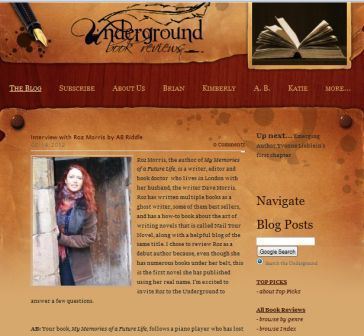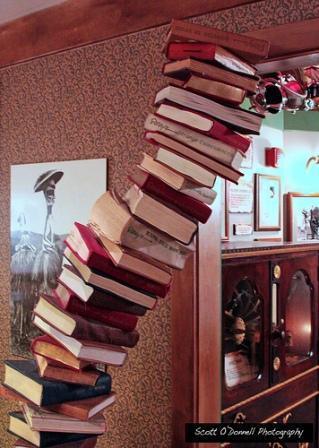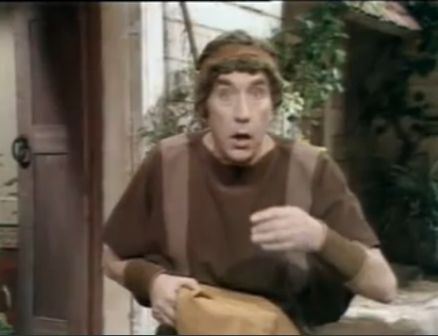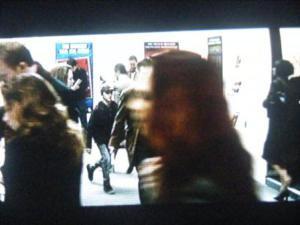Roz Morris's Blog, page 100
February 14, 2012
'I wanted the words to sound like music' – The Undercover Soundtrack, Jessica Bell
 I am seriously envious of my Undercover Soundtrack guest this week. As she developed her characters and their world, she found it natural to write the songs of the story too – and then headed into the studio to record them. The result? Her novel has its very own original soundtrack on iTunes. She is Jessica Bell, a poet and songwriter as well as a wielder of the literary art, and her novel is String Bridge. Join me at the red blog to hear more.
I am seriously envious of my Undercover Soundtrack guest this week. As she developed her characters and their world, she found it natural to write the songs of the story too – and then headed into the studio to record them. The result? Her novel has its very own original soundtrack on iTunes. She is Jessica Bell, a poet and songwriter as well as a wielder of the literary art, and her novel is String Bridge. Join me at the red blog to hear more.
In other news, I'm planning a newsletter! Add your name to the mailing list here.








Underwater music and understanding a character's passion – interview at Underground Book Reviews
 How did I develop the underwater world of the Soothesayers for My Memories of a Future Life? What experience did I draw on to create the musician narrator Carol? Did I start my blog to plug my writing book (a timely question considering this week's post)? What's this Life Form 3 novel I mention from time to time?
How did I develop the underwater world of the Soothesayers for My Memories of a Future Life? What experience did I draw on to create the musician narrator Carol? Did I start my blog to plug my writing book (a timely question considering this week's post)? What's this Life Form 3 novel I mention from time to time?
My Memories of a Future Life was reviewed yesterday at Underground Book Reviews, and today they're in interview mode, digging for answers… including how do I prove I ghostwrote those bestsellers? And will my career as a movie extra ever amount to anything? Come and delve…
If you have tackled any of the questions I was asked about – including creating worlds or understanding a character's passion, share in the comments!








February 12, 2012
Should you publish your novel to build your platform?
 Here's a phrase I'm hearing alarmingly often: 'I'm going to self-publish my novel and use it to build my platform'.
Here's a phrase I'm hearing alarmingly often: 'I'm going to self-publish my novel and use it to build my platform'.
Sorry, but that's the wrong way round.
Except in a very few cases, it doesn't work.
Non-fiction
You can build a platform with a non-fiction book. If you're offering expertise, it's easy to find the people who need it. If you write about a life experience, you can connect with readers who seek similar support. And there are far fewer of you – and more room to be heard.
But novels?
Before you use your novel to launch your platform, go and look at Facebook. Goodreads. Twitter. Everyone is waving a novel.
The number of people you will reach by starting this way is negligible.
Successful self-publishers
There are many examples, of course, of successful self-published fiction authors. Everyone has their favourites to brandish. I'm going to talk about Joanna Penn. She didn't start with a novel. She started with a blog – The Creative Penn – and built a loyal following while she taught herself about the writing and publishing world. By the time she launched her first novel, Pentecost, she had a great relationship with a lot of people.
Relationships rock
Relationships are what sell books, both fiction and non-fiction. That's what a platform is.
So to build your platform, get out there and blog, tweet, Facebook or whatever. Be natural, be yourself and build relationships. It's also much less of a strain if you're not trying to sell something.
And since you're not using your novel to build your platform, what are you going to do with it?
You might as well, um, query with it.
Stop grinding your teeth at the back there. We're agreed that relationships sell books? Agents have relationships with publishers. Publishers have relationships with distributors, the press, the places you cannot get reviewed if you do it all yourself. Yes, agents and publishers take their cut, but that's because they have a much bigger reach than one little writer on their own.
If you don't like the way a deal adds up, you can always refuse it. Or negotiate. But if you never try, you don't know what might have happened. If you want to have a publishing career (and why otherwise would you build a platform) it make sense to explore all the options.
'But every agent has different taste…'
Good writing is good writing. All agents are able to spot it. If you target enough agents who are a good fit for you, you will find out whether you are ready to go into print (or pixels) – or whether you should develop more. It is worth knowing that, isn't it?
'But it takes time…'
You're going to have to spend that time building your network anyway. And what's the hurry? You can't – or didn't – learn to write overnight.
'But everyone's publishing…'
I understand you're impatient to get out into the big publishing party. Really I do. When I first held a book that was filled with my words I felt the earth quiver.
But I'm now seeing a lot of people who have whizzed onto Kindle, are finding their novel doesn't sell, and are getting dispirited. That's a shame. That's the sound of dreams shattering.
Please don't mutter the name of Amanda, the lady my friend Porter Anderson dubbed Amanda Hocking [example of everything]. That's exactly what she is – an example of anything you like, including holy amounts of luck (and I wish her plenty more luck, BTW). But will the law of probabilities allow that to happen to you?
Build the relationship first
Relationships sell books. Build the relationship first, in whatever way you like, partnering with whoever seems right. That may be conventional industry routes; it may be creative collectives. Then you will have a platform, and you will have readers.
Thanks for the pic, Scottnj
While we're on the subject of being grown-up about platforms, I'm planning a newsletter! Add your name to the mailing list here.
So, agree? Disagree? Sending the lynch mob…? I'm sure you'll have plenty to say in the comments








February 7, 2012
'A ballad of fairyland, but not sweet and innocent…' – The Undercover Soundtrack, Katherine Roberts
 All novels need a dreaming stage, and my Undercover Soundtrack guest this week conjures hers in a rich aural tapestry of Celtic folk music and the lush whispers of Clannad. Indeed with a debut novel titled Song Quest, what would you expect? The first in her Pendragon Legacy series launches this week, and she'll be talking about the music that inspired both the story and the feisty heroine. Meet Katherine Roberts over at the Red Blog today
All novels need a dreaming stage, and my Undercover Soundtrack guest this week conjures hers in a rich aural tapestry of Celtic folk music and the lush whispers of Clannad. Indeed with a debut novel titled Song Quest, what would you expect? The first in her Pendragon Legacy series launches this week, and she'll be talking about the music that inspired both the story and the feisty heroine. Meet Katherine Roberts over at the Red Blog today
In other news, I'm planning a newsletter! Add your name to the mailing list here.








February 5, 2012
Prologues: please use responsibly
 If there's one word likely to make an editor bristle, it's prologue. Why? Because in many of the unready manuscripts I see, they're not necessary.
If there's one word likely to make an editor bristle, it's prologue. Why? Because in many of the unready manuscripts I see, they're not necessary.
Writers often have trouble deciding where they're going to start their story. The first chapter takes multiple rewrites, mind-changes, tweaks and deletions. Chapter 1 frequently has more scar tissue than any other part of a novel.
There are so many decisions to make about what to squeeze in and what to leave out. Sometimes writers get carried away and I see novels with any or all of:
an introduction
a mission statement
an explanation of themes
a foreword (which as a tweeter has pointed out is technically written by someone other than the author)
a prologue
or sometimes two prologues.
Often these are little more than instructions for how to read what follows. But there are times when a prologue is welcome. Here's my guide to using prologues responsibly.
Not all bad
Readers relish prologues when:
they show us something important that is out of the main story's timeline, for instance something that would otherwise have to be shown in flashbacks or cumbersome exposition
they show action or characterisation that the reader needs to understand chapter 1, for instance the start of a war or a quest
they are vivid and entertaining in their own right
Even prologue enthusiasts do not like:
an info-dump for its own sake – or back story that should be worked into the main text in a more natural way or was simply not needed (writers are prone to include too much back story and resort to prologues to shoehorn it in)
when a prologue is really just the first chapter, given a fancy name – if you put prologue at the top, it had better be truly separate
when a prologue is a rehash of a dramatic moment from later in the story, shown out of order because the start of the book does not have enough of a hook.
 However, as with everything arty, there's a fine balance to be struck. You can get away quite nicely with a prologue that comes from a scene near the end of the novel, to make us wonder how the characters got into such a mess.
However, as with everything arty, there's a fine balance to be struck. You can get away quite nicely with a prologue that comes from a scene near the end of the novel, to make us wonder how the characters got into such a mess.
Genre makes a difference
Some genres are more forgiving of prologues – fantasy and science fiction, for instance. These readers enjoy being plunged into unfamiliar worlds, and so the scene-setting aspect of a prologue is a helpful device.
But the closer the genre is to the everyday world of the reader, the less necessary a prologue is – because these readers want to be whirled in, immediately, to the people and the story they are going to follow, at the point that is most likely to hold their interest. They want you to unravel everything naturally and with your storytelling skill. However, they don't mind:
prologues that show a crisis from near the end of the novel – perhaps the main character on their deathbed or in some sort of showdown
an event from a point of view that we will never revisit.
If you're doing the latter, does it need to be a prologue? Many thrillers start with a startling event that happens to a character we will most likely never see again – quite often their gruesome demise. But these are usually called chapter 1. Why? Because they are the start of the story. Even though we're probably not going to hear a squeak from those unfortunate characters again. If your opening could quite happily be called chapter 1, you don't need to call it a prologue.
The first steps are the hardest
Novels are big. It's always hard to work out how to introduce an enormous work you know intimately to someone who knows nothing about it – and to do justice to it. You'll find this with the first chapter. You'll also find it with the pitch you'll write for an agent or editor, or the sales blurb, or if you try to answer that beastly question 'what's your novel about?'.
Sometimes prologues are useful and welcome. But make sure you really, really need one. And you probably don't need two.
I'm planning a newsletter! I know, that's terribly grown-up. Add your name to the mailing list here.
In the meantime, share your thoughts on prologues – good and bad – and examples if you have any!








January 31, 2012
'These songs infused my writing with the freedom Vivian experienced on that vivid night' – The Undercover Soundtrack, Mary Vensel White
 My Undercover Soundtrack guest this week has had a start many writers would envy. She posted her novel on the HarperCollins writer community Authonomy and this week it will be the first release under the new Authonomy imprint. That novel is The Qualities of Wood, the story of a couple who swap city life for the country, becoming enmeshed in a mystery that has far-reaching personal consequences. Join me on the red blog, where Mary talks about the music that went into her novel's making and informed her characters' journeys.
My Undercover Soundtrack guest this week has had a start many writers would envy. She posted her novel on the HarperCollins writer community Authonomy and this week it will be the first release under the new Authonomy imprint. That novel is The Qualities of Wood, the story of a couple who swap city life for the country, becoming enmeshed in a mystery that has far-reaching personal consequences. Join me on the red blog, where Mary talks about the music that went into her novel's making and informed her characters' journeys.








January 29, 2012
The empty world – is your novel eerily deserted?

 This is me, passing before your eyes as an extra in Clint Eastwood's film Hereafter . (Here's my post about it, since you ask. Back now? On we go.) Blink and you'd miss me because your eye would quite rightly be on Matt Damon and the other characters who mean something to you.
This is me, passing before your eyes as an extra in Clint Eastwood's film Hereafter . (Here's my post about it, since you ask. Back now? On we go.) Blink and you'd miss me because your eye would quite rightly be on Matt Damon and the other characters who mean something to you.
And look at all the other folk in the scene. Extras, nameless, not even in the script. All of us, there to be ignored.
But if we weren't there you'd miss us even more.
Too quiet
Something I see so often in first novels is that scenes look unpopulated. The main characters and the setting may be well drawn, but there is no sense that there is anyone else in the world of the story. School gates are deserted; the shopping mall is empty; there is never another car on the road. It makes the reader feel something is wrong. Background people are a crucial detail for making us feel a scene is real.
I know why this happens. When you envisage a scene, it's hard enough to put in all the stuff that is relevant. But the background?
Directors on big movies have the same problem. They concentrate on the principals. The job of making a background come to life belongs to the assistant director and team. You almost have to do a similar thing yourself when writing – make one of your jobs populating the background.
Of course, you don't want too much of it. It mustn't get in the way. When you're opening a scene and letting the reader know who's where and what they're doing, add a person or two – perhaps a woman with her chin snuggled in her yellow scarf, walking fast to her car. The postman in a fluorescent vest swinging his leg over his bicycle.
You can use details of movement or life to punctuate pauses in dialogue or to underline tensions. Perhaps one of your characters hears a clack of bricks being thrown from the scaffolded house into a skip. He thinks that throwing something was exactly what he felt like – and instead he's having a conversation that's going nowhere. Or someone sitting in a cafe sees someone at an adjacent table waving to a passing friend and it reinforces their sense of being alone.
Imagination wrung out like a rag?
Of course, we've all got enough to think about inventing our significant stuff. It used to frustrate me too until I discovered Flickr. Now I search for a street scene or a bar and grab one that has the right look and feel. Instant background people – and I can get back to the characters I know and what they're doing.
When you're setting your scene, don't forget the unimportant people.
Do you have any tips for populating a scene? Share in the comments!








January 25, 2012
How did I dare self-publish… and should you? Interview at Welcome To Exeter…
 How did I know my books were fit to publish? Did I work with editors on them? What kind of expert input do you need if you're self-publishing? Should you in fact, seek a traditional publisher first or go straight to KDP and hit 'send'? What were the biggest challenges and surprises once I did the deed? What bugs me about the indie 'scene', if you can call it that?
How did I know my books were fit to publish? Did I work with editors on them? What kind of expert input do you need if you're self-publishing? Should you in fact, seek a traditional publisher first or go straight to KDP and hit 'send'? What were the biggest challenges and surprises once I did the deed? What bugs me about the indie 'scene', if you can call it that?
I'm at Jennie Coughlin's blog today, answering these questions and more. Jennie might be familiar to some of you as a recent guest on The Undercover Soundtrack over at the red blog, where she talked about writing Thrown Out: Stories from Exeter. She's also a journalist and has made it her mission this year to lobby for high standards in indie publishing. To this end, she is grilling those of us who've dared to publish our darlings. Come over and see how I did…








January 24, 2012
'The devastation left behind when someone dies' – The Undercover Soundtrack, Margot Kinberg
 My guest today on The Undercover Soundtrack is mystery novelist Margot Kinberg. She says songs and the ideas she gets from them have always been woven into the stories she writes. Her novel B-Very Flat, which spins around the murder of a young music student, drew inspiration from JS Bach to Billy Joel to Andrew Lloyd Webber, influencing the way she developed her characters and understood their troubles. Join me now at the red blog for the full story
My guest today on The Undercover Soundtrack is mystery novelist Margot Kinberg. She says songs and the ideas she gets from them have always been woven into the stories she writes. Her novel B-Very Flat, which spins around the murder of a young music student, drew inspiration from JS Bach to Billy Joel to Andrew Lloyd Webber, influencing the way she developed her characters and understood their troubles. Join me now at the red blog for the full story








January 22, 2012
Don't tell us she's special. Show us
 You know one of the best ways to irritate someone? Keep telling them how wonderful a person is who they don't know – and never say why. 'She's so lovely.' 'She's great.' 'She's terrific.' Result? After a while, you think 'she' is anything but.
You know one of the best ways to irritate someone? Keep telling them how wonderful a person is who they don't know – and never say why. 'She's so lovely.' 'She's great.' 'She's terrific.' Result? After a while, you think 'she' is anything but.
I've been reading a novel where the author has been doing exactly this. The main character has been separated from a girl he has fallen in love with, and for long periods is wondering if he'll ever see her again. The author did a grand job of setting up the romance earlier. The problem was when he was separated from her and the yearning began.
Tell me again, I can't bear it
We have endless screeds of 'he loved her so much'. 'She had a certain something.' (What did she have? Three ears?) 'He felt a pain whenever he thought of her.' (In what way was he thinking of her?') It was unsatisfying, empty – and pretty soon very irritating.
Why? Readers (in general, not just heartless old me) don't like being told what to feel. We want to feel it too. Or we actually react the other way. (Which is fine if that's what you want. In this book it wasn't the case.)
Besides, it's not truthful. Perhaps that's why we resent it, because it seems empty and insincere. When someone's really missing their dear one, they don't remember their summary of the emotion. They'd get an exquisite flashback of the time they got lost together walking back from the bus stop in the pitch dark. They'd find themselves snagged by faces in a crowd, because their foolish brain was saying 'wouldn't it be lovely if she was there'.
Show not tell
This is, of course, showing, not telling. And it's so powerful. Showing makes the reader feel what the character feels. It casts a spell of experience. It is not analytical. It is not a summing-up. It presents the truth and lets the reader make up their mind.
Show not tell is one of the hardest things for a writer to remember. The example that provoked this post is actually from a published novelist of otherwise impeccable accomplishments. Show not tell requires the most imaginative effort and all the writers I know slip unintentionally from time to time.
I've often wondered why this is. Maybe it's because our analytical brain is saying 'in this scene he missed her' and it's easy to write that. Showing it means we have to submerge into the character's experience – which isn't always easy. But showing intimately what a character feels is one of the most gripping things a writer does. Good writing isn't words. It's an experience. And experience is not analytical.
Don't write the analysis. Write the experience.
Let's play a game. Find an example you like and leave it in the comments – and afterwards show how you'd squash it flat by telling instead of showing. I'll kick off.
'Once he had been strong enough to lift a carousel horse in each arm. That was a long time ago.' Mitch Albom, The Five People You Meet in Heaven. Telling version: 'He used to be so strong'.
Take it away, guys
Thanks for the pic Philip Morton





